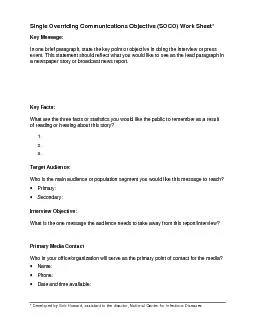PPT-My Objective in this “Conversational” Overview
Author : pamella-moone | Published Date : 2018-03-20
Is to raise an awareness to the following matters namely that An appreciation of the underpinnings of the science of quantifying uncertainty is germane for
Presentation Embed Code
Download Presentation
Download Presentation The PPT/PDF document "My Objective in this “Conversational�..." is the property of its rightful owner. Permission is granted to download and print the materials on this website for personal, non-commercial use only, and to display it on your personal computer provided you do not modify the materials and that you retain all copyright notices contained in the materials. By downloading content from our website, you accept the terms of this agreement.
My Objective in this “Conversational” Overview: Transcript
Download Rules Of Document
"My Objective in this “Conversational” Overview"The content belongs to its owner. You may download and print it for personal use, without modification, and keep all copyright notices. By downloading, you agree to these terms.
Related Documents














